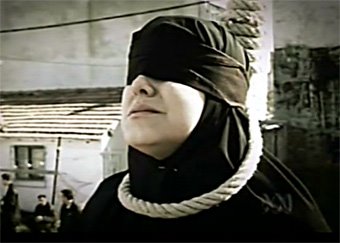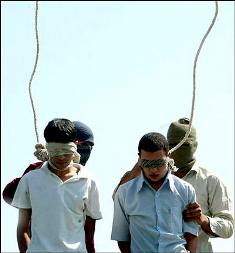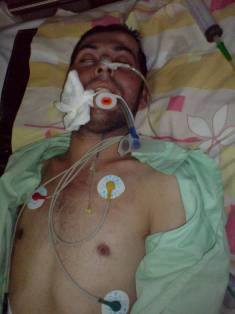Thursday 30 July 2009
IMHRO: Kidney trading by Iranian Security Service
Ref.IMHRO.62
Life for people in the minorities’ areas in Iran is becoming increasingly desperate. As a result of poverty and lack of investment in health and education, life expectancy in many of the minorities’ areas in Iran is only about 45 years. And the harsh economical conditions are increasingly forcing people living in such areas to sell their own kidneys and other vital organs.
36 year old Omar. D a Kurd from Mariwan told IMHRO that he had to sell one of his kidneys to feed his family.
Javad. N an Arab man from Ahwaz said he sold his kidney for $500. “Is this how life should be? I live in an area with the richest gas and oil reserves in the world, yet I have to sell my kidney in order to survive. I don’t like my life.” He told IMHRO.
Reza Washahi a researcher on minorities told IMHRO: “The Iranian government deliberately does not invest in minorities’ areas and unemployment is rocketing. In the Ahwaz area instead of giving the jobs in the oil industry to local people the government gives those jobs to non-Arabs in order to encourage immigration and change the demography of the area. Late at night you can see impoverished people searching in rubbish bins for food”
We asked Omar. K why the Iranian government does not stop the trade in human organs? He said that most of medical centres buying kidneys are related to government. “It is a big business”.
Some reports indicate that revolutionary guards’ medical centres and the security service are involved in kidney trading. It is reported that they sell the organs of prisoners before execution.
Similar cases are reported in Baluchistan. Mr. S.M told IMHRO he witnessed the funeral of executed political prisoners who had scars from surgery on their kidney area. “When we asked the guards what happened to the prisoners’ kidneys they did not answer and just buried the bodies”
IMHRO is appealing to the UN to put pressure on the Iranian government to recognise the rights of minorities in Iran and to investigate the dehumanising trade in the kidneys and other organs of political prisoners.
RFERL: Sufi Dervishes Detained In Iran

AFP: Iran 'arrests prominent film director' at cemetery

"Panahi, his wife Tahereh Saeedi and daughter Solmaz were arrested today at Behesht-e Zahra," the source who declined to be named told AFP.
Monday 27 July 2009
RFERL: Two Iranian Christians May Face Execution For Apostasy

Wednesday 22 July 2009
Comic Campaign: New Campaign by IMHRO
Ref.CC1
22/07/09
In IMHRO we decided to produce and reproduce some of the finest jokes regard of situation in Iran, and revealing what is going on, we do believe those jokes will help to spread around awareness more than e-mails!! Plus give you a smile!!
Please share them with your colleagues and your friends and show solidarity regard of Human Right of minorities in Iran.
Comic Campaign 1:
Two members of minorities in notorious Evin prison in Tehran having this conversation:
'How many years did you get?
'Five.'
'For what?'
'For nothing.'
'You're lying!
‘Why you call me lire?
‘For nothing they give ten!
AKI: Iran: Leading feminist lawyer 'arrested'

Tuesday 21 July 2009
VOA: Iran Hangs Insurgents in Sistan-Baluchistan Province

By Edward Yeranian Cairo
Iran has hanged 13 men from the Sunni insurgent group, Jundallah, after condemning them for a series of attacks in the country's southern Sistan-Baluchistan province.The official Iranian News Network (IRIN) announced the executions during its news bulletin, calling the insurgents who were hanged in Sistan-Baluchistan province, "terrorists," and detailing their alleged crimes.The men were originally scheduled to be hanged in public, but their executions were moved indoors to Zabedan prison, "at the last minute," according to the provincial judiciary chief.
Iran's official news agency, IRNA, reported that the men were accused of a series of crimes, including kidnappings, killings, and bombings for the insurgent group Jundallah.The brother of the group's leader was also due to be hanged alongside the other men, but his execution was postponed until "later in the week," according to IRNA. Iranian radio had initially announced his hanging, as well. Those hanged were officially branded "mohareb," or "enemies of God," a charge which carries the death penalty in Iran.
Analysts fear more unrest after hangingsAnalysts said the hangings could fuel further unrest in Iran's tense southeastern province of Sistan-Baluchistan. The mostly Sunni Muslim province borders Pakistan and Afghanistan and has an active separatist movement.Iran frequently accuses Jundallah, whose name signifies "soldiers of God," of drug-smuggling and terrorism. It also alleges the group is allied with al-Qaida and is supported by the U.S. and Britain.Advisor on International Terrorism to Britain's House of Commons, Richard Kemp, said Iran frequently charges people with terrorism, without proper evidence and that it likes to accuse the United States and Britain of involvement."You have got to question the Iranians' idea of justice and you have got to question what evidence the regime has against these particular individuals.
The Iranians have done deals with elements of al-Qaida in the past. When it suits them, they will support al-Qaida's brand of terrorism," said Kemp.
"Obviously, if they are able to prove that the individuals that they have executed are terrorists, then I do not think we should be too unhappy about the way they deal with them, as long as they have gone through a proper judicial process. But the Iranians have a habit of identifying people as terrorists when they are not necessarily terrorists, and they will connect any group like that with America or the British because it is the popular thing to do," he added.
Blood is seen inside a mosque in Zahedan, southeast Iran, after an explosion killed 15 and wounded 50 on 28 May 2009Jundallah claimed responsibility for a May bombing inside a Sistan-Baluchistan mosque that left 25 people dead.The group, which also calls itself the "People's Resistance Movement of Iran," claims to be defending the rights of Baluchis and of Sunni Muslims inside mostly Shi'ite Iran.Jundallah's leader, Abdolmalik Rigi told al-Arabiya TV in October his group was "fighting to have the same rights of Iranian Shi'ites," and not to be "second-class citizens."
Friday 17 July 2009
EuropeNews: Two Christian Converts are Still Imprisoned by Iran

…
Evin Prison
Saadat Abad
Tehran
Islamic Republic of Iran
…
Saturday 11 July 2009
amnesty Inetrnational: Seven religious minority members face execution in Iran

Seven members of Iran's Baha’i religious minority could face the death penalty if convicted on Saturday.
The seven are to appear before Branch 28 of the Revolutionary Court in Tehran where they are likely to be charged with mofsed fil arz (being corrupt on earth), "espionage for Israel”, “insulting religious sanctities” and “propaganda against the system."
Amnesty International has called on the Iranian authorities to release the seven members of the Baha’i minority, whom the organization considers to be prisoners of conscience.
The detainees were arrested in March and May 2008. Their families were told in May 2009 that they were now facing the additional charge of mofsed fil arz, which can carry the death penalty. Their lawyers have never been able to visit them since their arrest, though they have been allowed family visits.
The detainees are members of a group responsible for the Baha’i community’s religious and administrative affairs in Iran. They are held in Section 209 of Evin Prison, which is run by the Ministry of Intelligence.
Officers from the Ministry of Intelligence arrested six of the group’s leaders - Fariba Kamalabadi Taefi, Jamaloddin Khanjani, Afif Naeimi, Saeid Rezaie, Behrouz Tavakkoli and Vahid Tizfahm - following raids on their homes on 14 May 2008.
A seventh person, acting as a secretary for the group, Mahvash Sabet, was arrested on 5 March 2008. Fariba Kamalabadi Taefi, Behrouz Tavakkoli and Jamaloddin Khanjani had previously been arrested for their activities on behalf of the Baha’i community.
The Baha’i faith was founded about 150 years ago in Iran and has since spread around the world. Since the establishment of the Islamic Republic of Iran in 1979, the Baha’i community has been systematically harassed and persecuted.
There are over 300,000 Baha’is in Iran, but their religion is not recognized under the Iranian Constitution, which only recognizes Islam, Christianity, Judaism and Zoroastrianism. Baha’is in Iran are subject to discriminatory laws and regulations, which violate their right to practice their religion freely.
The Iranian authorities also deny Baha’is equal rights to education, to work and to a decent standard of living by restricting their access to employment and benefits such as pensions. They are not permitted to meet, to hold religious ceremonies or to practice their religion communally. Since President Ahmadinejad was elected in 2005, dozens of Baha’is have been arrested.
Members of the Baha’i community in Iran profess their allegiance to the state and deny that they are involved in any subversive acts against the government, which they say would be against their religion. The Baha’i International Community believes that the allegations of espionage for Israel, which have over the years been made against the community in Iran, stem solely from the fact that the Baha’i World Centre is in Israel.
The organization has also urged the Iranian authorities to drop the charges against the seven, to ensure that they are protected from torture and other ill-treatment and to ensure that they are given regular access to their families, lawyers of their choice and any medical treatment they may require.
Wednesday 8 July 2009
IMHRO: Iranian security service injecting HIV Virus to minorities who took apart a protest
Ref.IMHRO.61
Sources inside Iran told IMHRO that Security service use HIV Virus to inject minorities who took a part in recent protests.
Reports indicates that this happened in Arabs, Kurds and Turkish area Prisons. At least 4 people reported to died under torture in Kurdistan.
Unknown new graves also reported in various parts of Baluchistan, including Zahedan. Local people reported that Revolutionary Guards in midnight buried people there.
IMHRO is very worry regard of treatment of minority’s prisoners in Iran. We ask international community to investigate these reports. IMHRO fear that Islamic Regime using chaos as opportunity for more ethnic cleanse.
Monday 6 July 2009
RFERL: Iranian Opposition Tarred By Public Confessions From Arrested Protesters

By Charles Recknagel
The streets of Tehran have gone quiet for the first time in more than 10 days. Instead of gathering in downtown squares by the tens or even hundreds of thousands, the protesters appear now to have been forced off the streets.The last gathering, on June 22, saw just a few hundred assemble. The protest was quickly broken up with tear gas and shots in the air as helicopters hovered overhead.Still more fearsome for those who dared to come out may have been the silhouettes of sharpshooters in the windows of nearby buildings and policemen taking pictures of the crowd.
The pictures have been used by police for arrests after rallies have ended.By official count, 17 people have died since the protests broke out immediately following the June 12 presidential election. State radio has said that some 457 people were arrested on June 20, when the confrontations between the protesters and the police and paramilitary Basij militia were fiercest.
Now, the government is raising the stakes for the protesters still higher by showing some of those who have been arrested on state television. Public ConfessionsOn June 23, the television showed one detainee confessing to what amounts to collaboration with foreign powers against the Iranian state."I think we were provoked by networks like the BBC and VOA [Voice of America] to take such immoral actions," the young man said. His face was shown but he was not identified by name.Similarly, a woman was shown saying she, too, "was influenced by VOA Persian [service] and the BBC because they were saying that the security forces were behind most of the clashes." She said that after that "I was curious, I wanted to go out and see what was happening. I saw that it was us protesting who were making the riots.
We set on fire public property, we threw stones, we attacked people's cars and we broke windows of people's houses."
The arrested protesters claimed they were motivated by foreign broadcasts.Her face was pixilated on the screen and her name wasn't given.Iranian Interior Minister Sadeq Mahsuli said that rioters involved in postelection violence were funded by the CIA and the exiled opposition group the People's Mujahedin, or Mujahedin-e Khalq Organization.
The aired statements from the detainees come as a senior judiciary official said on June 23 that the legal system would make an example of those who had been caught."Those arrested in recent events will be dealt with in a way that will teach them a lesson," Ebrahim Raisi said.Raisi said a special court had been set up to deal with the protesters.
In Iran "special" courts often refers to revolutionary courts, which are tribunals outside of the usual civil court system. Trials in revolutionary courts are behind closed doors and conducted by a single clerical judge who takes on the combined roles of prosecutor, defense lawyer, and jury. Sentences are usually multiple years in prison. The judiciary, a conservative bastion, routinely brought reformist activists before such courts during the sharp conservative backlash that crippled the presidency of reformist Mohammad Khatami.
Avoiding Direct ConfrontationRaising the stakes further, Iran's best-trained and best equipped military force, the Islamic Revolution Guard Corps (IRGC), threatened on June 23 to intervene directly. Until now, crowd control has been left to the police and the Revolutionary Guard's subsidiary, the Basij militia.
Will the protesters confront the security forces again?A statement on the Revolutionary Guard's website said protesters should "be ready for the decisive and revolutionary confrontation" with the IRGC, Basij, and other security forces.
The IRGC is the political wing of the military, meaning that military force would
be used against fresh protests.Meanwhile, the intelligence department of the police has urged citizens to help officers identify leaders of protests.With previous rally sites in Tehran now sealed off by police, the demonstrations against the presidential election results are moving toward safer forms of protests.
Nightly in Tehran, people go to their rooftops at dusk to shout their discontent. The slogan is "Allahu Akbar" (God is great), a watchword of the 1979 Islamic Revolution. The police are unable to move against those shouting because for decades the words have been used as an expression of loyalty to Iran's theocratic system.Similarly, opposition protests are taking the form of turning on car lights simultaneously at a given time of day. Backroom Battle For PowerThe task for the government now is how to push the protesters completely out of sight.The strategy is likely to focus on putting increased pressure on opposition leader Mir Hossein Musavi.
The editor of Musavi's newspaper, "Kalemeh Sabz" (Green Word) said that police have arrested 25 journalists and other staff. The paper was shut down about 10 days ago by officials.On June 23, the head of the conservative parliament's Judiciary Committee, Ali Shahrokhi, said Musavi's call for "illegal protests" were "criminal acts."Musavi, a former prime minister and a loyalist of Iran's theocracy, has insisted that peaceful protests are allowed under the Islamic republic's constitution.
Musavi's wife, Zahra Rahnavard, was quoted on her website as calling on the security forces to immediately release those detained at the election protests. She also said it is "my duty to continue legal protests to preserve Iranian rights."The conservatives have also fired warning shots at a senior backer of Musavi, former President Akbar Hashemi Rafsanjani.
Security forces briefly arrested four of Rafsanjani's female relatives over the weekend, including his daughter Faezeh, who has appeared at Musavi's rallies. State television quoted Supreme Leader Ayatollah Ali Khamenei as saying on June 24 that Iran's establishment would not yield to pressure over the disputed presidential election.All this may mean that the duel between reformists and conservatives now will increasingly move off the public stage and into the establishment's corridors of power. But whether the conservatives can beat their challengers there as effectively as they have on the streets remains to be seen. The establishment is deeply split over the political and economic future of the Islamic republic and the street protests are simply one measure of how deep the differences run.























































